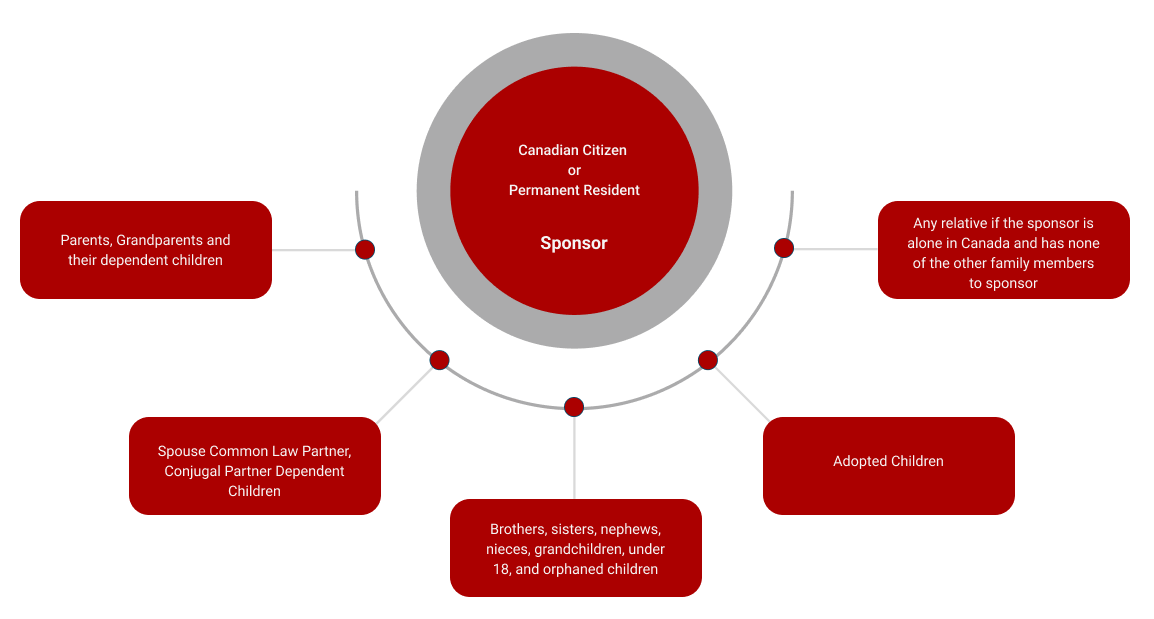Family Class
Canada’s Family Class sponsorship programs are designed to allow Canadian citizens and permanent residents to sponsor their family members to come to Canada and become permanent residents. The Family Class sponsorship programs include:
- Spousal Sponsorship : Canadian citizens and permanent residents can sponsor their spouse or common-law partner to come to Canada and become permanent residents.
- Parent and Grandparent Sponsorship : Canadian citizens and permanent residents can sponsor their parents and grandparents to come to Canada and become permanent residents
- Dependent Child Sponsorship : Canadian citizens and permanent residents can sponsor their dependent children, including adopted children and those under legal guardianship, to come to Canada and become permanent residents.
To sponsor a family member, the sponsor must first meet the following eligibility criteria:
Relationship to Sponsor

- Age : The sponsor must be at least 18 years old.
- Status : The sponsor must be a Canadian citizen or permanent resident.
- Financial Capacity : The sponsor must meet the minimum necessary income requirements to support the sponsored family member(s) once they arrive in Canada. This requirement ensures that the sponsored family member(s) will not require social assistance from the Canadian government.
- Relationship : The sponsor must have a genuine and continuing relationship with the sponsored family member(s) and must be willing to provide financial and emotional support.
- Undertaking : The sponsor must sign an undertaking agreement with the Canadian government, agreeing to support the sponsored family member(s) for a certain period of time, usually up to 20 years, depending on the type of sponsorship.
Once the sponsor meets the eligibility criteria, they can begin the sponsorship process by submitting a sponsorship application to Immigration, Refugees and Citizenship Canada (IRCC). The sponsored family member(s) must also submit an application for permanent residency.
The sponsorship process can be broken down into the following steps:
Application process for Sponsoring Spouse, Partners, and Dependent Children
Sponsor & PR Applicant
Sign and submit complete application kit:
Forms, evidentiary supporting documents, and applicable fees
Intake: CPC-M
Screen application for completeness IRPR, ss 10 & 11
Request sent to principal applicant to create online account and link MYAPP
Principal applicant to validate Schedule A form online account and submit police certificates.
Assessment: CPC-M
Officer assesses sponsor’s eligibility under IRPR’s 133
Assessment
Visa office assesses principal applicant’s admissibility
Principal applicant follows instructions for medical exam
- Sponsorship Application : The sponsor must submit a sponsorship application to IRCC, along with supporting documents, including proof of status, income, and relationship with the sponsored family member(s).
- Permanent Residency Application : The sponsored family member(s) must submit an application for permanent residency to IRCC, along with supporting documents, including proof of identity, relationship with the sponsor, and medical and police clearance certificates.
- Processing : IRCC will review both the sponsorship application and the permanent residency application, including conducting background checks and verifying the authenticity of the documents submitted.
- Approval : If both the sponsorship and permanent residency applications are approved, the sponsored family member(s) will receive a confirmation of permanent residency (COPR) and can then travel to Canada to become permanent residents.
The processing time for Family Class sponsorship applications varies depending on the type of sponsorship and the location of the sponsored family member(s). Generally, it can take several months to process a sponsorship application.
Sponsoring a relative who has no family members in their home country can be challenging, but it is still possible under certain circumstances. In general, the Family Class sponsorship programs require that the sponsor and the sponsored family member(s) have a genuine and continuing relationship and that the sponsor agrees to provide financial and emotional support to the sponsored family member(s) upon their arrival in Canada.
If the sponsored relative has no family members in their home country, it may be more difficult to demonstrate a genuine and continuing relationship with the sponsor. However, if the sponsor can provide evidence of a longstanding and close relationship with the sponsored relative, such as regular communication over a long period of time, this may help to demonstrate the genuineness of the relationship.
It is also important for the sponsor to demonstrate that they have the financial capacity to support the sponsored relative in Canada, as well as a plan for integrating the sponsored relative into Canadian society. This may include finding suitable housing, arranging for language classes, and helping the sponsored relative find employment.
In some cases, sponsors may need to provide additional evidence to support their sponsorship application, such as letters of reference from community members or religious leaders, or evidence of other social ties between the sponsor and the sponsored relative.
It is important to note that sponsorship applications are evaluated on a case-by-case basis, and each application is assessed based on its own merits. The eligibility criteria and requirements for the Family Class sponsorship programs can be complex, so it may be helpful to consult with an immigration lawyer or consultant to determine the best approach for sponsoring a relative with no family members in their home country.
Get In Touch
At SignRight it is not just our duty but our passion to make your dreams come true. Regardless of your needs, we will work with an unwavering commitment to make sure your needs are met.
Get your first assessment for FREE
